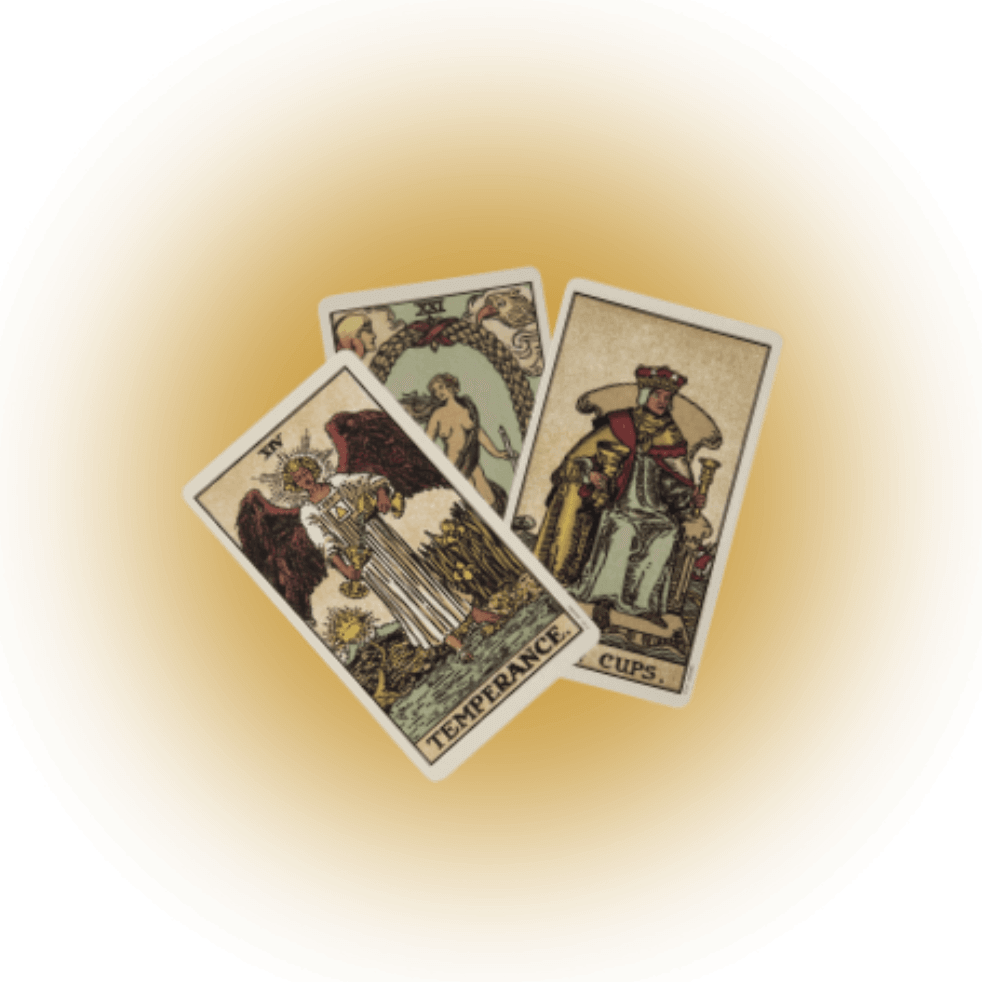What Is Tarot Reading?
Tarot reading is using 78 cards to look at what’s happening in your life right now. Not predicting the future. Not telling you what to do. Just helping you see patterns you’re missing and work out what your actual options are.
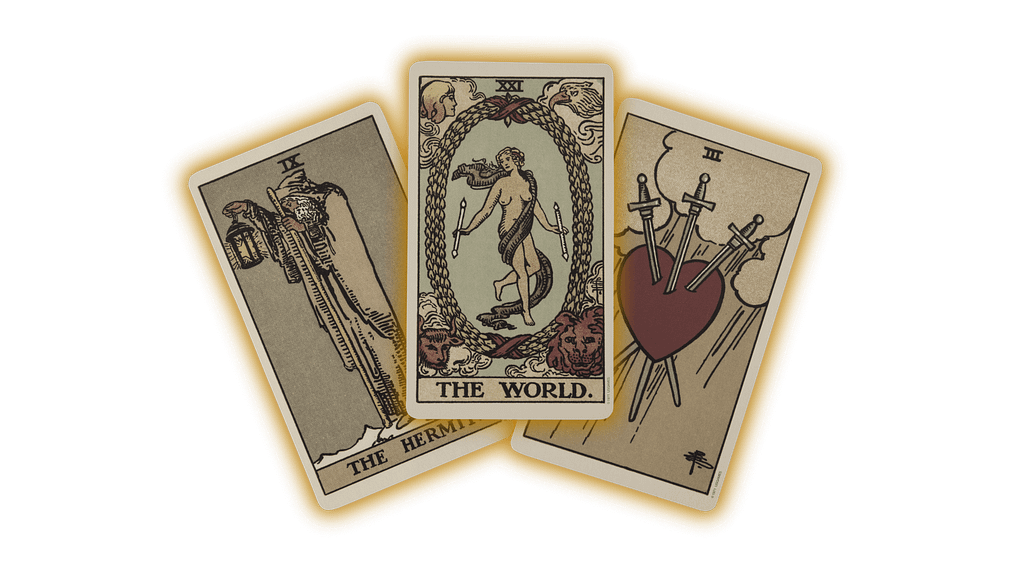
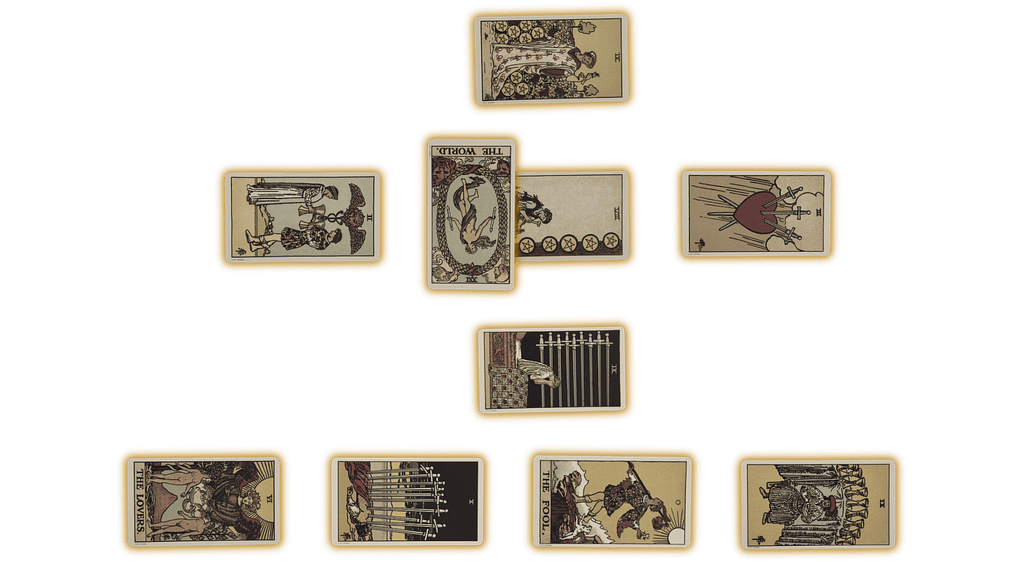
How A Tarot Reading Actually Works
A reading is a conversation. You bring a question or a vague “something feels off” feeling. I pull cards. We talk about what they’re showing. You leave knowing what’s actually going on and what you can do about it.
Bring something to look at
Could be a specific question. Could be “I don’t know what the fuck is happening but something feels off.” Either works. Open questions are better than yes/no questions. “What do I need to know about this job situation?” beats “Will I get the job?”
Pick a spread
Different layouts for different questions. Three cards for quick clarity. Celtic Cross for complex situations. Spread positions show you what’s happening, what’s blocking you, what your options are. The structure helps organise the conversation.
Look at the cards
Notice symbols, colours, repeated numbers, dominant suits. I decide whether to read reversals before we start. We keep the language plain – no mystical bollocks, just what’s useful.
Connect it to your actual life
Does this fit what’s happening? Do the timelines make sense? Are there blind spots you’re missing? If something feels sensitive, we slow down and check consent before going further. The point is clarity, not overwhelm.
Work out what happens next
Tarot shows likely paths if you keep doing what you’re doing. We look at your options, resources, and risks. I use if/then framing – if you do X, Y becomes more likely. Keep timeframes short to medium. Tarot is about choice, not fate.
Leave with next steps
One to three practical actions. Take a photo or notes. Notice what stood out. Come back to it later and see what’s changed.
If you want to know how to prepare, I’ve written a guide on that here.
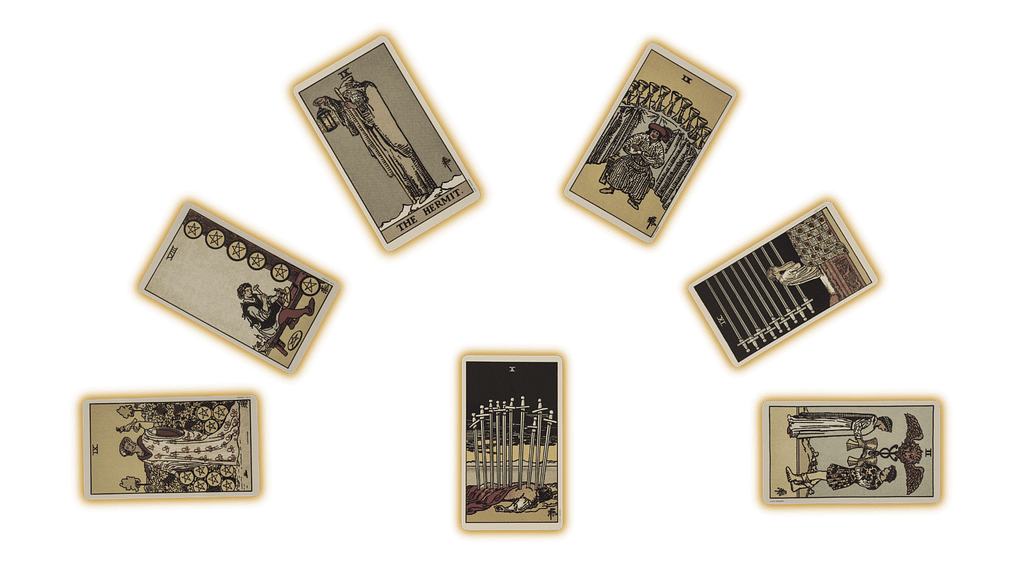
The Short Version
Tarot reading uses 78 cards to reflect your situation clearly. You leave with insight that helps you make decisions, not predictions about a fixed future.
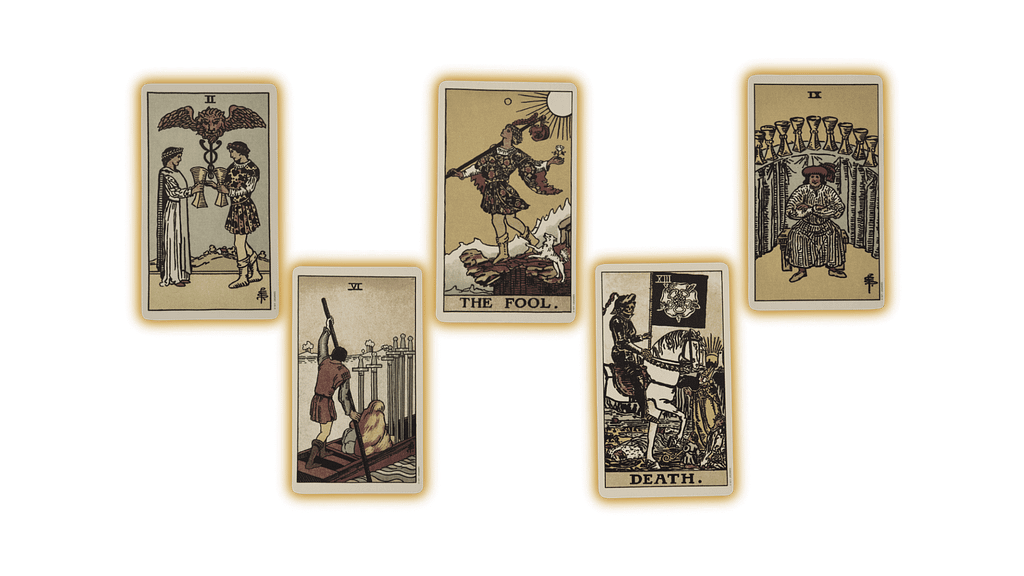
What’s In A Tarot Deck
78 cards split into two groups: Major Arcana and Minor Arcana. The Major Arcana are the big life themes. The Minor Arcana are everyday patterns.
Major Arcana
22 cards. The big shifts – identity changes, endings, new beginnings, turning points. These are the headline themes that shape who you are and where you’re going.
Minor Arcana
56 cards split into four suits. Cups for feelings and relationships. Wands for drive and action. Swords for thoughts and communication. Pentacles for body, work, and material life. These ground readings in daily reality.
For deeper dives on specific cards, see my Tarot Card Meanings hub.
What Tarot Helps With
Tarot highlights patterns, surfaces blind spots, and offers clarity when life feels messy. It helps you see your options so you can make decisions with confidence.
Pick what fits your situation:
- Seasonal and Special Occasions – birthdays, new chapters, marking transitions
- Life Change and Shadow Work – something’s ending or beginning, you need orientation
- Career and Creativity – work feels stuck, you need a spark
- Love and Relationships – dynamics feel messy, you want a way through
- Self-Care and Empowerment – you need to reclaim energy and agency
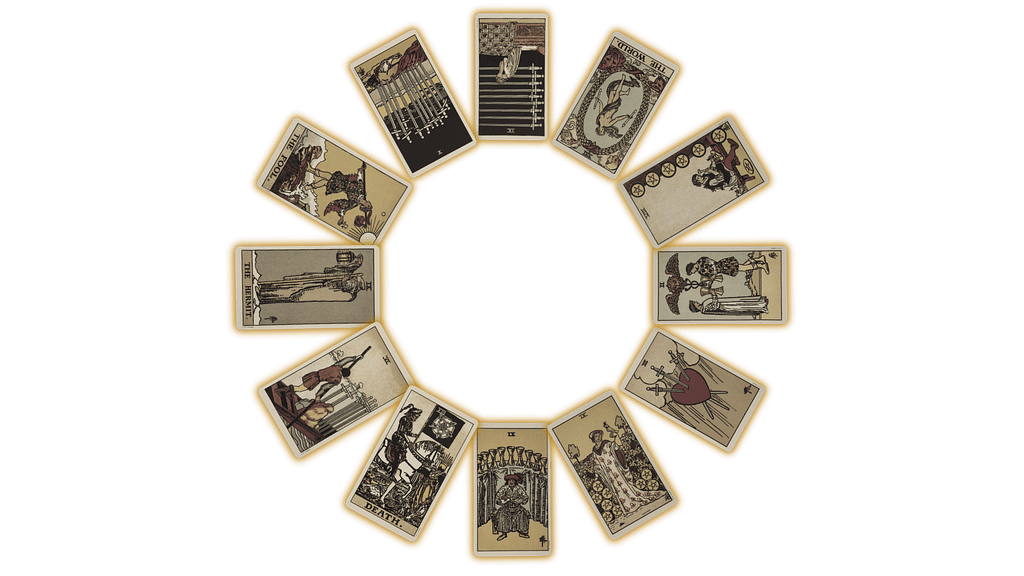
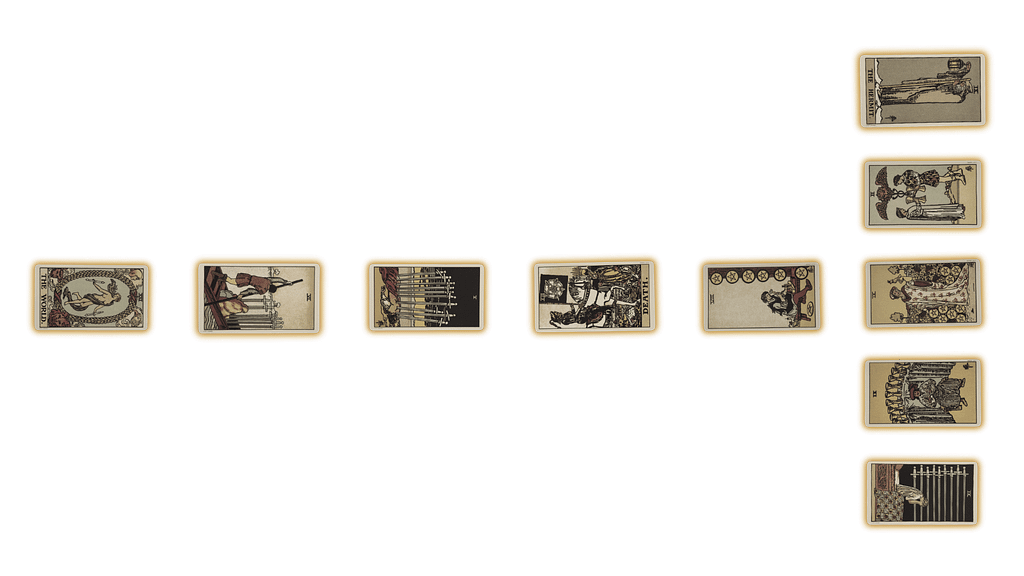
Tarot vs Oracle Cards
Tarot and oracle cards both offer reflection, but they work differently:
- Structure: Tarot follows a 78-card system. Oracle decks are unique to the creator.
- Best for: Tarot is strong for spotting patterns and longer stories. Oracle is best for single themes or affirmations.
- Learning curve: Tarot takes study, but has a common language across decks. Oracle is easy to start and deck-specific.
For more details, read my Tarot vs Oracle breakdown.
Quick History of Tarot
Tarot started as a card game in fifteenth century Italy. By the eighteenth century, people were using it for symbolic and esoteric exploration. Now many readers use it as a reflective tool for clarity and decision making.
Some decks have been especially influential: the Visconti Sforza, Tarot de Marseille, Etteilla Tarot, Rider-Waite Smith, and Thoth. I’ve written full breakdowns in my Decks That Changed Tarot series.
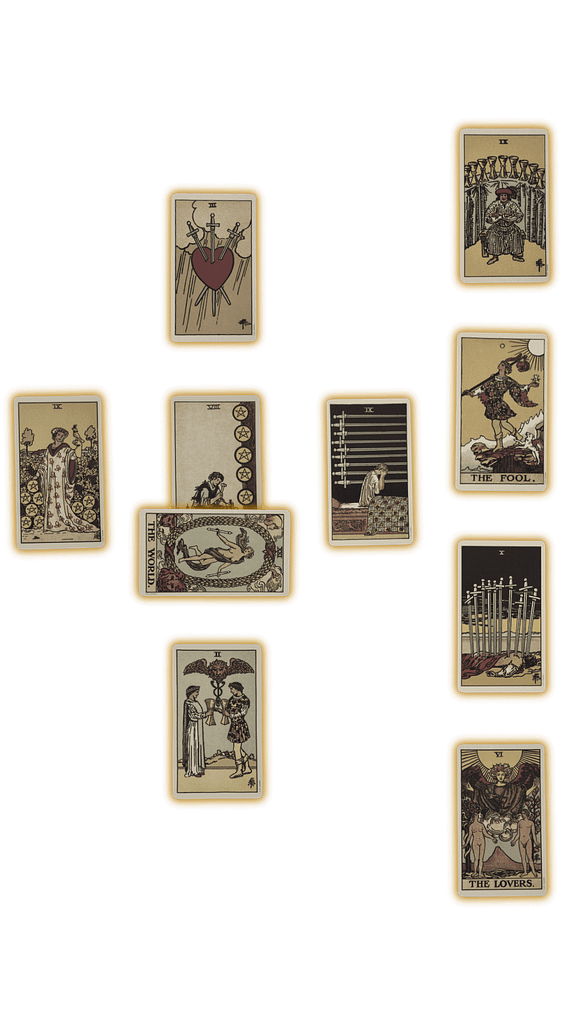
Frequently Asked Questions
What happens during a tarot reading?
You bring a question or theme. I shuffle and lay out cards in a spread. We look at the symbols, numbers, and suits together. I interpret what they're showing. We connect it to your actual life. You leave with clarity on what's happening and what to do next. It's a conversation, not a performance.
Is tarot fortune telling?
No. Tarot doesn't predict a fixed future. It reflects your present situation, highlights patterns you're repeating, and shows likely outcomes if nothing changes. The value is in choice and awareness. You shape the future through informed action, not by being told what will happen.
How accurate are tarot readings?
Accuracy depends on the reader, how clear your question is, and your openness. Tarot highlights what's true in the moment and shows where current patterns might lead. It can't guarantee results but offers a clearer map so you can make informed choices that influence outcomes.
Can I read tarot for myself?
Yes. Many people do. Start with simple spreads and ask open questions. Treat self-readings as a reflective dialogue with yourself. They help you build intuition, reveal blind spots, and connect present decisions with longer term patterns in your life.
Do I need to be spiritual to use tarot?
No. You can approach it as a reflective tool that prompts thought and dialogue. The imagery sparks ideas and helps you process decisions. If you are spiritual, you can also frame tarot as a way of connecting with something greater, adding another layer of meaning.
Is tarot evil or dangerous
No. Tarot is a set of illustrated cards used as a reflective tool. Some religious traditions view it with suspicion, but in practice tarot is about reflection, clarity, and conversation. It encourages self-awareness and supports decision making rather than inviting harm or negativity.
Can tarot predict the future?
Tarot doesn't predict a fixed future. The cards reflect your present and show where current patterns may lead if nothing changes. By highlighting choices, risks, and resources, tarot empowers you to shape outcomes. It's about guidance and perspective, not prophecy or absolute certainty about what will happen.
How long does a tarot reading take?
Depends on the question and spread. A short session might last 15 to 20 minutes and cover one focused theme. Longer readings can take up to an hour, allowing space for more detail, multiple topics, and reflection on practical next steps.
Is tarot the same as mediumship?
Tarot isn't the same as mediumship. Mediumship involves communication with spirits or the deceased. Tarot uses a 78 card system to reflect current patterns and choices. Both are forms of spiritual practice, but tarot is grounded in imagery and symbolism rather than spirit communication.
Do you have to be psychic to read tarot?
You don't need to be psychic to read tarot. Anyone can learn the card system and practice connecting the imagery with real life situations. Over time readers often build intuition, but tarot is just as much about pattern recognition, reflection, and conversation as it is about any psychic sense.

Ready To Book?
Book a session now, in Manchester or online via Zoom.

